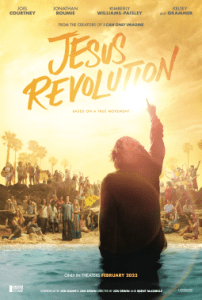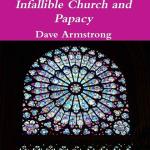I watched the film Jesus Revolution last night. It was wonderful and heartwarming. My daughter Angelina said that she didn’t usually care much for Christian movies (for the usual reasons heard: mediocrity, syrupy-sweet, etc.), but liked this one because it was “real” and portrayed life and people as they really are. This is the trend now. May it continue indefinitely!
I want to concentrate on one particular aspect of the film that touches upon Christian theology and the sacraments. Throughout the movie, the wave of young people and/or hippies who “came to Jesus” in the late 60s and early 70s as part of the Jesus movement revival, get “baptized” by the hundreds in the Pacific Ocean. Now, readers may wonder why I put quotations mark around the word baptized in the previous sentence. It’s because I don’t think most of these acts were actually the sacrament of baptism.
First of all, the Catholic Church believes that all trinitarian baptisms, wherever conducted, are legitimate, and usher the recipients into the Body of Christ, and bring about regeneration (whether someone believes that it does that or not). That’s one thing, but the other issue in play is the status of infant baptism vs. what’s known as “believers’ baptism”: the notion that a person must be fully aware of what they are doing in being baptized, and hold to the usual required Christian beliefs, which rules out infant baptism: practiced by Catholics, Orthodox, Lutherans, Presbyterians, Methodists, Anglicans, and some other Protestant groups. The film portrays adults choosing to get [what they think is] baptized. Therefore, it’s portraying the [minority] “Baptist” theological outlook on the matter.
Note: Greg Laurie, one of the main characters of the film, was actually not raised in a Christian home, so in his case, what was very beautifully and dramatically visualized in the film, was indeed his true baptism, and hence, sacramental baptism. But he would have been a rare exception to the rule.
How these sincere and pious acts are regarded in terms of theology and sacramentology depends on one’s view. According to the position of infant baptism, most of these well-intentioned and meaningful acts in the Pacific Ocean were not in fact instances of baptism, for the simple reason that virtually all of the young people involved (at that time and place) would have been baptized already, either as an infant or as an “aware” younger adult voluntarily choosing to undergo believers’ baptism. Once having been baptized, a person cannot do so again.
In the outlook of the film and generally speaking, in the minds of the adherents of this particular type of revivalism, it’s almost as if the seekers and inquirers have no Christian background at all, and are as pagan or non-Christian as a Stone Age tribe in the wilds of the Amazon jungle. But in 1969-1972, almost everyone in America (apart from those of other religions) was raised in some sort of Christianity, with varying degrees of commitment, and this included baptism for virtually every such Christian above the age of 13 or 14.
The typical model or trend of the time (which is even more true today) was that young people rejected the practice of the Christian faith in their teen years (often out of lack of proper faith formation or nominal, “hypocritical” parents, but also frequently due to secularizing, anti-traditional peer pressure), and rebelled and got into free sex and drugs, left-wing anti-traditionalism, and oftentimes various occultic or eastern religious practices that are contrary to Christianity. The film marvelously depicts those who rejected these alternate lifestyles and came back to Christianity. The question then becomes: “what do these ostensible ‘baptisms’ in the ocean mean, or represent?”
I want to make clear that I’m not questioning intent or sincerity. I’m happy that they did this. I admire them. These were people who were open-mindedly seeking Jesus, willing to “count the cost” and desiring to become His wholehearted disciples, who regarded what they wrongly thought (in most cases) was baptism as the entranceway into this new transformed spiritual life. I actually did this myself. I was baptized as a baby in Methodism, but in 1982, after five years as a Protestant evangelical, I decided to get “baptized” because I had come to accept “believer’s baptism.” I was acting consistently with my beliefs. My wife Judy did the same, and she was raised Catholic. So these simply weren’t valid baptisms. But it doesn’t follow that they had no meaning at all.
For those interested, I make the case for infant, regenerative baptism on my Baptism and Sacramentalism web page. From the perspective of a belief in infant baptism, what took place with all these zealous new converts in the ocean (or lakes or rivers in other places) — excepting the few who had never been baptized — was more like a “wet confirmation” of sorts: if I may be permitted to use such a term for the sake of explanation. The sacrament of confirmation has to do with the coming of the Holy Spirit to a greater and deeper degree, and a renewal or reaffirmation of the gifts and graces received in baptism (see my mentor Fr. John A. Hardon’s wonderful summary of those), as a young adult who intellectually understands what is happening. Fr. Hardon describes the sacrament of confirmation:
The sacrament in which, through the laying on of hands, anointing with chrism, and prayer, those already baptized are strengthened by the Holy Spirit in order that they may steadfastly profess the faith and faithfully live up to their profession. Confirmation is not strictly necessary for salvation, but it is eminently important in contributing to Christian perfection and there is a grave obligation to receive it in due time.
He defines “confirmation character” in the following way:
The indelible sign imprinted on the soul by the sacrament of confirmation. Its distinctive qualities are that it assimilates a person more closely to Christ, the Teacher of Truth, the King of Justice, and the High Priest. St. Thomas Aquinas holds that the confirmation character gives a person the power and the right to perform actions that are necessary in the spiritual battle against the enemies of the faith. He distinguishes the fighters of Christ (the confirmed) from the simple members of Christ’s kingdom (the baptized) and explains that confirmation empowers and entitles those who receive it to not only preserve the faith but to make public profession of what they believe and a sense of mission to extend this faith to others.
But the ostensible “baptisms” in the movie were not technically confirmation. They only approximated what takes place in confirmation. The relationship of sacraments and the indwelling of the Holy Spirit, along with making a personal commitment to Jesus in a way that is described by evangelical and charismatic Protestants as being “saved” or “born again” gets complicated when we compare the different theological positions. My own past history may be instructive or illustrative of this.
I was a nominal Methodist in early childhood, and my family stopped going to church in 1967, when our congregation ceased existing. Thus I stopped attending church from that time until 1980 (ages 9-22). Up until Easter 1977 I lived virtually as a “practical atheist” (i.e., “as if God didn’t exist”) — much like millions of “secularized” or irreligious people are doing today — and I eventually got involved in various occultic beliefs and practices, though, thankfully, not free sex and drugs. My brother Gerry had been part of the wave of the Jesus movement (in a Lutheran church in Detroit) and “got saved” in 1971. Largely through his influence, after stubbornly resisting it for years, I underwent a deeply felt personal conversion to Christ in 1977, in significant part due to watching the great Christian movie, Jesus of Nazareth, which — rather profoundly — brought the Bible vividly to life for me.
I didn’t get “baptized” again, however, because Lutherans believe in infant baptism; therefore, this wasn’t part of the experience of the long-haired “Jesus people” who worshiped at this particular church. My experience and new resolve was completely real and sincere. But it wasn’t getting “saved” in an instant, according to my Catholic beliefs. It was (as I would now view it) a commitment to Christ and desire to follow Him wholeheartedly as a disciple, and to lead a transformed life henceforth. My experience came complete with a strange and fearful night of virtually battling with the devil (not physically, but in my head!), who seemed to be unwilling to let me depart my nominal practical atheism (which in turn was a confirmation of the rightness of my decision). I woke up in the morning with the most amazing feeling of being “liberated” that I had ever had. The Holy Spirit had done His work, and He always wins in a battle against Satan. I was “in.”
God works with people according to what they know, as I recently reiterated in writing about the Asbury Revival currently taking place on college campuses. He had a plan for my life, and it involved working with me through various stages of gross ignorance of theology, rebellion, and pride, including having not the slightest clue regarding Catholicism till the age of 32, in 1990. After my 1977 conversion, I still didn’t attend church on Sunday, to worship. I didn’t care for the Lutheran (in many ways, Catholic-like) liturgy — made no bones about it! — and only attended weeknight Bible studies. But I learned a ton of things about Christianity and my Christian life was formed and given a direction as a result of it.
The next big change came in August 1980, when I decided to “switch gears” a bit and attend a small non-denominational Jesus movement-inspired fellowship called Shalom House, which emphasized Christian rock music and heartfelt, spontaneous charismatic worship. I believe that I soon experienced a “filling of the Holy Spirit” in great measure, that changed my life forever. Within a year-and-a-half, I became involved in street witnessing, took up the apologetics which began my career, started doing counter-cult research, read the entire Bible, gave up my very progressive socio-political and immoral “free sex” views (which was perfect, God-ordained timing before meeting my wife in 1982), and became pro-life.
But I did all this without the benefit of an adult baptism or the sacrament of confirmation. It was real. I experienced it. My life changed. My very profession today as an apologist and evangelist — and whatever good fruit it has produced by God’s grace — came about as a result of it. God can work with people in whatever way He chooses. If they don’t understand Catholicism (or even any form of Protestantism in any meaningful way), He can and will — out of His infinite love and mercy — work with a willing heart and provide a flow of grace to them. I was “filled with the Holy Spirit” to a great measure at this time, which was my personal “revolution.” The charismatics would regard this as the “baptism of the Holy Spirit” and maybe it was in some sense. I personally prefer the Pauline expression of “be filled with the Spirit” (Eph 5:18). I have heard that the sense Paul is expressing there is “be filled continually with the Holy Spirit.”
In other words, it can happen more than just once (and hopefully is continuous), whether at baptism or confirmation or outside of either sacrament. The Amplified Bible, which seeks to explicitly bring out the exact meanings of passages, renders this clause as “be filled with the [Holy] Spirit and constantly guided by Him.” The “Classic Edition” of the same Bible has “ever be filled and stimulated with the [Holy] Spirit.” The Contemporary English Version has “let the Spirit fill your life.” International Standard Version translates it as: “keep on being filled with the Spirit.” The wonderful Phillips paraphrase renders it “let the Spirit stimulate your souls.”
This is what I believe was happening in those Pacific Ocean “baptisms” during what Time Magazine called the “Jesus Revolution.” People had a profound experience and yielded up their sins and their lives to Jesus. God gave them a large measure of the Holy Spirit, along with a big dose of grace, and they became serious disciples of our Lord Jesus Christ. Their lives changed (hopefully, for most of them, for good). They repented of, and gave up various serious sins.
The evangelicals would call it being “saved” or “born again” according to their theology. Catholics, on the other hand, believe salvation has an ongoing sense (“work out your salvation with fear and trembling”), and can be lost if one isn’t vigilant. And we believe that the sacraments play a role in sustaining our salvation, all the way to heaven, if we “press on” as Paul says, and don’t willfully reject God’s grace. Besides baptism and confirmation, the sacrament of the Eucharist plays a key role in the spiritual life, Catholics believe, and the sacrament of reconciliation (confession and absolution). Marriage is also a sacrament (and it is for two lifelong Protestants who get married). Sacraments are physical means of receiving the grace that God has for us.
The sacraments, among many other things, are what Catholicism offers as a “supplement” to the positive, evangelical experience and belief-system. These aspects are what we call the “fullness” of historic Christian Catholic faith. For those who have experienced a wonderful reawakening of their spiritual life within an evangelical or revivalistic framework, I declare (as one who has also experienced what you have) that there is much more that you can experience and possess and learn, to your great benefit in the Catholic Church. To move from evangelicalism to Catholicism is not a rejection of what came before, but, for the most part, building upon or expanding it.
***
Practical Matters: Perhaps some of my 4,000+ free online articles (the most comprehensive “one-stop” Catholic apologetics site) or fifty-one books have helped you (by God’s grace) to decide to become Catholic or to return to the Church, or better understand some doctrines and why we believe them.
Or you may believe my work is worthy to support for the purpose of apologetics and evangelism in general. If so, please seriously consider a much-needed financial contribution. I’m always in need of more funds: especially monthly support. “The laborer is worthy of his wages” (1 Tim 5:18, NKJV). 1 December 2021 was my 20th anniversary as a full-time Catholic apologist, and February 2022 marked the 25th anniversary of my blog.
PayPal donations are the easiest: just send to my email address: [email protected]. You’ll see the term “Catholic Used Book Service”, which is my old side-business. To learn about the different methods of contributing, including 100% tax deduction, etc., see my page: About Catholic Apologist Dave Armstrong / Donation Information. Thanks a million from the bottom of my heart!
***
Photo credit: poster for the film, Jesus Revolution [Wikipedia / free use]
***
Summary: I examine the sacrament of baptism and other sacraments, according to Catholicism, and relate them to the mass “baptisms” in the film Jesus Revolution.














